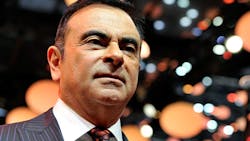After Ghosn, France and Japan Turn to Car Partnership He Built
Amid the upheaval created by Carlos Ghosn’s downfall, the main players in Japan and France can at least agree on one thing: securing the two-decade old Renault-Nissan car alliance is more important than the man who led it.
Hours after Nissan voted unanimously to remove Ghosn as chairman, French Finance Minister Bruno Le Maire and Japanese Economy Minister Hiroshige Seko pledged their strong support for the alliance, calling it a “winning cooperation.” It’s a view shared publicly by Nissan’s new strong man, Chief Executive Officer Hiroto Saikawa, who told the press after the board meeting that stabilizing the current structure is the best way forward.
The public commitment shows how the key stakeholders in the alliance want to avoid Ghosn’s downfall from wrecking what has become one of the biggest car groups in the world. Both Renault and Nissan have benefited greatly over the years from closer integration, and the two companies would struggle to compete alone in an industry facing major transformation that require huge financial commitments to stay ahead.
The future of the alliance carries significant political weight particularly in France, where the state is Renault’s biggest shareholder. The French don’t see Ghosn’s jailing as a deliberate act to destabilize the alliance, said an official close to President Emmanuel Macron. The accusations against Ghosn are “unusual, precise, and serious,” he said.
It’s no secret that the Japanese have been unhappy about Renault’s outsize influence in the alliance. Still, it’s not a point of discussion on the agenda for now and certainly won’t be reviewed until the current governance situation is cleared, the official said, which is unlikely to be this year. Renault has a 43% voting stake in Nissan, which in turn owns 15% of Renault, with no voting rights.
The French are displaying their pragmatic side. While they acknowledged that Ghosn has been the keystone to the alliance, the partnership is viewed as more important to Renault and to French industry than the manager’s personal situation. To no small degree, the French are still catching up on developments, with the official saying that he and others only found out about Ghosn’s arrest in the press.
Still, France has extended more support than is typical to Ghosn, who has been in detention since Monday. He’s been visited by the French ambassador to Japan, an unusual move that shows the high political stakes in the unfolding drama.
Ghosn has been accused of financial misconduct, including under-reporting his income and misappropriating company funds. Prosecutors in Japan have said that he could face as much as 10 years in jail, calling the allegations one of the most serious categories of offenses.
Earlier this week, Renault put in place an interim CEO to fill Ghosn’s slot, though the board stopped short of ousting the manager outright. That differed from the Japanese approach, where the vote to remove him as chairman was unanimous.
About the Author
Bloomberg
Licensed content from Bloomberg, copyright 2016.
